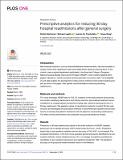| dc.contributor.author | Bertsimas, Dimitris J | |
| dc.contributor.author | Li, Michael Lingzhi | |
| dc.contributor.author | Paschalidis, Ioannis Ch. | |
| dc.contributor.author | Wang, Taiyao | |
| dc.date.accessioned | 2021-02-18T17:13:36Z | |
| dc.date.available | 2021-02-18T17:13:36Z | |
| dc.date.issued | 2020-09 | |
| dc.date.submitted | 2020-03 | |
| dc.identifier.issn | 1932-6203 | |
| dc.identifier.uri | https://hdl.handle.net/1721.1/129820 | |
| dc.description.abstract | Introduction New financial incentives, such as reduced Medicare reimbursements, have led hospitals to closely monitor their readmission rates and initiate efforts aimed at reducing them. In this context, many surgical departments participate in the American College of Surgeons National Surgical Quality Improvement Program (NSQIP), which collects detailed demographic, laboratory, clinical, procedure and perioperative occurrence data. The availability of such data enables the development of data science methods which predict readmissions and, as done in this paper, offer specific recommendations aimed at preventing readmissions. Materials and methods This study leverages NSQIP data for 722,101 surgeries to develop predictive and prescriptive models, predicting readmissions and offering real-time, personalized treatment recommendations for surgical patients during their hospital stay, aimed at reducing the risk of a 30-day readmission. We applied a variety of classification methods to predict 30-day readmissions and developed two prescriptive methods to recommend pre-operative blood transfusions to increase the patient’s hematocrit with the objective of preventing readmissions. The effect of these interventions was evaluated using several predictive models. Results Predictions of 30-day readmissions based on the entire collection of NSQIP variables achieve an out-of-sample accuracy of 87% (Area Under the Curve—AUC). Predictions based only on pre-operative variables have an accuracy of 74% AUC, out-of-sample. Personalized interventions, in the form of pre-operative blood transfusions identified by the prescriptive methods, reduce readmissions by 12%, on average, for patients considered as candidates for pre-operative transfusion (pre-operative hematoctic <30). The prediction accuracy of the proposed models exceeds results in the literature. | en_US |
| dc.language.iso | en | |
| dc.publisher | Public Library of Science (PLoS) | en_US |
| dc.relation.isversionof | http://dx.doi.org/10.1371/journal.pone.0238118 | en_US |
| dc.rights | Creative Commons Attribution 4.0 International license | en_US |
| dc.rights.uri | https://creativecommons.org/licenses/by/4.0/ | en_US |
| dc.source | PLoS | en_US |
| dc.title | Prescriptive analytics for reducing 30-day hospital readmissions after general surgery | en_US |
| dc.type | Article | en_US |
| dc.identifier.citation | Bertsimas, Dimitris et al. "Prescriptive analytics for reducing 30-day hospital readmissions after general surgery." PLoS ONE 15, 9 (September 2020): e0238118. © 2020 Bertsimas et al. | en_US |
| dc.contributor.department | Massachusetts Institute of Technology. Operations Research Center | en_US |
| dc.relation.journal | PLoS ONE | en_US |
| dc.eprint.version | Final published version | en_US |
| dc.type.uri | http://purl.org/eprint/type/JournalArticle | en_US |
| eprint.status | http://purl.org/eprint/status/PeerReviewed | en_US |
| dc.date.updated | 2021-02-05T16:37:58Z | |
| dspace.orderedauthors | Bertsimas, D; Li, ML; Paschalidis, IC; Wang, T | en_US |
| dspace.date.submission | 2021-02-05T16:38:03Z | |
| mit.journal.volume | 15 | en_US |
| mit.journal.issue | 9 | en_US |
| mit.license | PUBLISHER_CC | |
| mit.metadata.status | Complete | |
